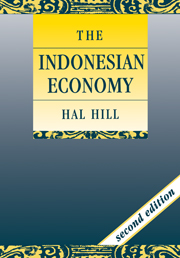Book contents
- Frontmatter
- Contents
- List of Tables
- List of Figures
- Preface and Acknowledgements to the First Edition
- Preface and Acknowledgements to the Second Edition
- Glossary and Abbreviations
- Maps
- 1 Introduction
- 2 An Overview of Economic Development Since 1966
- 3 Money and Finance
- 4 Fiscal Policy
- 5 International Dimensions
- 6 The State and Public Policy: Ideology and Intervention
- 7 Agricultural Modernization
- 8 The Industrial Transformation
- 9 The Services Revolution
- 10 Poverty, Inequality and Social Progress
- 11 The Regional Dimension: Patterns and Issues
- 12 Conclusion: Looking to the Future
- 13 Postscript on the Crisis
- Chronology of Major Economic Events, 1965 to 1993
- Notes
- Bibliography
- Index of Author Citations
- Index
1 - Introduction
Published online by Cambridge University Press: 05 June 2012
- Frontmatter
- Contents
- List of Tables
- List of Figures
- Preface and Acknowledgements to the First Edition
- Preface and Acknowledgements to the Second Edition
- Glossary and Abbreviations
- Maps
- 1 Introduction
- 2 An Overview of Economic Development Since 1966
- 3 Money and Finance
- 4 Fiscal Policy
- 5 International Dimensions
- 6 The State and Public Policy: Ideology and Intervention
- 7 Agricultural Modernization
- 8 The Industrial Transformation
- 9 The Services Revolution
- 10 Poverty, Inequality and Social Progress
- 11 The Regional Dimension: Patterns and Issues
- 12 Conclusion: Looking to the Future
- 13 Postscript on the Crisis
- Chronology of Major Economic Events, 1965 to 1993
- Notes
- Bibliography
- Index of Author Citations
- Index
Summary
PRELUDE: A 1960S BASKET CASE
If the central purpose of economics is to understand why and how growth rates vary across countries and over time, Indonesia is surely one of the best laboratories. By the mid–1960s, many informed observers despaired of any prospect of significant economic advance. Benjamin Higgins, the author of the most influential book on Development Economics at that time, and one who had extensive experience of the country during the 1950s, characterized Indonesia as the “chronic dropout”. He concluded that “Indonesia must surely be accounted the number one failure among the major underdeveloped countries” (Higgins, 1968, p. 678). Some years earlier, in his introduction to Geertz's classic Agricultural Involution, Higgins wrote: “The story of Java seems to be one of repeated nipping off of a budding entrepreneurial upsurge by a political elite essentially hostile to it” (p. ix).
Gunnar Myrdal, in his monumental Asian Drama, offered an equally sober assessment: “As things look at the beginning of 1966, there seems to be little prospect of rapid economic growth in Indonesia” (Myrdal, 1969, p. 489). Other social scientists were equally pessimistic, with the Demographer Nathan Keyfitz fearing that population pressure on Java was becoming so intense that the island was “ … asphyxiating for want of land” (Keyfitz, 1965, p. 503).
Indonesia in 1965 was a “basket case”, its economic problems at least as serious as those of today's least developed countries in Africa and Asia.
- Type
- Chapter
- Information
- The Indonesian Economy , pp. 1 - 10Publisher: Cambridge University PressPrint publication year: 2000
- 4
- Cited by



